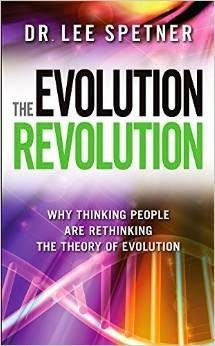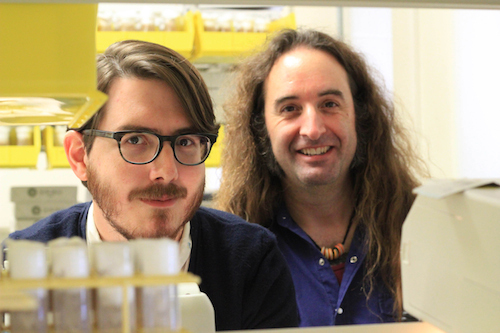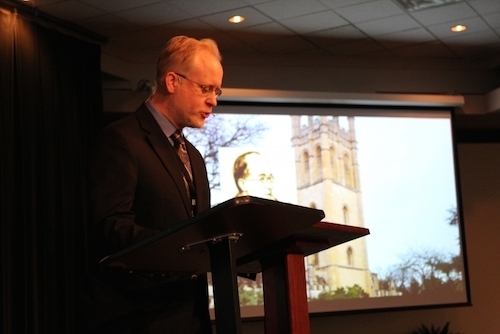Discovery Institute's Blog, page 215
October 21, 2014
What Do "Living Fossils" Mean for Evolution?

While some Darwin-critics make a big deal about so-called "living fossils," I've never discussed them much because it's never been entirely clear to me what they show, whether for or against neo-Darwinian evolution. Living fossils are of course organisms that have not changed at all over long periods of time. In some cases, such as the horseshoe crab, the coelacanth, or the ginkgo tree (pictured above), these species seem to have remained virtually the same for hundreds of millions of years....
Are Shell Spirals "Merely" Works of Physics?

A statement from CNRS, the French National Centre for Scientific Research, touts research in the Journal of Theoretical Biology. The news release states flatly, "Physics determined ammonite shell shape." It goes on to say that, even though individual shells of different species are "exceptionally diverse," they can all be explained by a biomechanical model.
"Their approach provides new paths for interpreting the evolution of ammonites and nautili," the article boasts. What's missing in this...
October 20, 2014
Dennett's Algorithm: An Exercise in Circularity
In Darwin's Dangerous Idea (DDI), Daniel Dennett reduced natural selection to an algorithm, or a set of mindlessly repeated steps.
But as far as I can see, he never tells us exactly what these steps are. I have looked long and hard. However, the omission is helpfully redressed by a Dennett admirer named Vincent Poirier in an Amazon comment on DDI. He identifies the Darwinian (Dennettian) algorithm as a four-step process:
Organisms pass their characteristics on to their descendants, which are m...
Revolutionary Biology

It is not surprising that for thousands of years people thought the Sun and stars revolve around the Earth. We see it with our own eyes every day and night. In 1543, however, Nicolaus Copernicus proposed that the Earth revolves around the Sun and thereby revolutionized our conception of the solar system and the universe. A century and a half later, Isaac Newton proposed laws of motion and gravitation to explain the behavior of all material bodies -- not only on the Earth but also in outer sp...
"Are We Really Conscious?": A Reply to Dr. Graziano's Brain
Last week my colleague Wesley Smith had a great post on an essay in the New York Times by Michael Graziano, a neuroscientist at Princeton. Dr. Graziano (pictured above) believes that we aren't really conscious. I thought I'd elaborate a bit on the problems with Dr. Graziano's thesis.
Dr. Graziano:
Are We Really Conscious?[W]hat is the relationship between our minds and the physical world? Here, we don't have a settled answer. We know something about the body and brain, but what about the subj...
October 19, 2014
The Evolution Revolution: Physicist Lee Spetner Shows Why Convergence Challenges Neo-Darwinian Evolution
 Many ENV readers might have read, or at least heard of, a well-argued 1996 book by Lee Spetner, Not By Chance. Spetner, who holds a PhD in physics from MIT, has recently published a sequel titled The Evolution Revolution: Why Thinking People Are Rethinking the Theory of Evolution (Judaica Press, 2014). The new book provides some wonderful arguments that challenge common descent and neo-Darwinian explanations of evolution.
Many ENV readers might have read, or at least heard of, a well-argued 1996 book by Lee Spetner, Not By Chance. Spetner, who holds a PhD in physics from MIT, has recently published a sequel titled The Evolution Revolution: Why Thinking People Are Rethinking the Theory of Evolution (Judaica Press, 2014). The new book provides some wonderful arguments that challenge common descent and neo-Darwinian explanations of evolution.
Spetner goes through many examples of non-random evolutionary changes th...
October 17, 2014
The Treasure Hunt Continues: More Uses for Non-Coding DNA

As we have noted many times, geneticists put the brakes on research when they concluded that much of the human genome was junk from our evolutionary past. The surge in discoveries of function in the junk has falsified their pessimism. Now, the smart money is on new and exciting purposes for that non-coding DNA.
Heterochromatin
That's the spirit shown by two biologists at Texas A&M University (pictured above) who are trying to unlock the non-coding half of the human genome, looking for understa...
October 16, 2014
Alister McGrath Wrongly Claims the ID Movement Has "Vigorously Oppose[d] the Teaching of Evolution"
Writing here yesterday, I showed that theistic evolutionist Alister McGrath misunderstands the nature of the case that ID proponents make ("Alister McGrath Mistakes Intelligent Design for a God-of-the-Gaps Argument"). McGrath also seriously misunderstands the educational policies advocated by the ID movement.
In his book Darwinism and the Divine (Wiley-Blackwell, 2011), he writes:
Writers linked with the creationist and 'Intelligent Design' movements in North America vigorously oppose the teac...
October 15, 2014
John West Explicates C.S. Lewis on Science, Scientism, and Skepticism

The Christian Post has a very thoughtful and thorough account of a presentation that Discovery Institute's John West gave at the National Conference on Christian Apologetics, analyzing C.S. Lewis's views on science and scientism. It's very much worth reading. One of the important and counterintuitive insights that Lewis offered was his observation that far from encouraging skepticism, the mention of "science" can call forth a perilous gullibility, not least from educated, intelligent people...
Alister McGrath Mistakes Intelligent Design for a God-of-the-Gaps Argument

BioLogos's concluding article in its series responding to Darwin's Doubt is by theologian and philosopher Alister McGrath, recently installed as the Andreas Idreos Professor at Harris Manchester College, University of Oxford. I'm a fan of much of McGrath's writings, but when it comes to intelligent design, there are problems. He has made a long series of inaccurate charges that ID is a "God of the gaps" argument. Oddly, McGrath's piece at BioLogos isn't about Darwin's Doubt at all. In fact,...
Discovery Institute's Blog
- Discovery Institute's profile
- 15 followers




